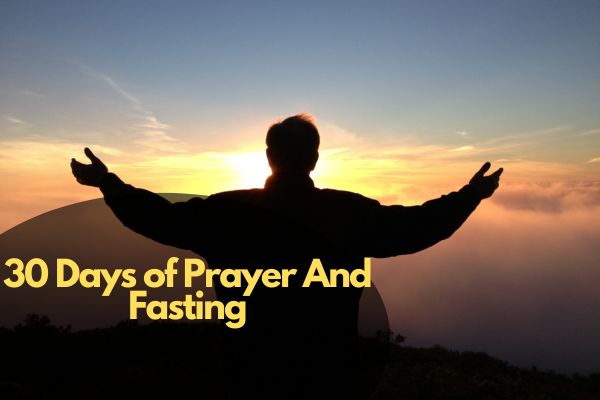Table of Contents Show
Committing to an extended period of prayer and fasting can seem intimidating initially. However, as we seek God in deeper and more focused ways, He promises to draw near to us as well (James 4:8). Immersing ourselves in 30 days of intentional prayer and fasting enables spiritual renewal and transformation in our walk with God.
Prayer and fasting are timeless spiritual disciplines that allow room for God to speak and move in our lives. Though challenging, committing to an extended 30-day season unlocks new dimensions of faith and spiritual vitality. If your devotional life has grown dull or distracted, setting aside concentrated time to seek God first through fasting will spark fresh passion in your walk with Him.
30 Days of Prayer And Fasting
A 30-day prayer and fast is an extended time of denying normal physical pleasures to focus your body, mind, and spirit on connecting with God in prayer. It facilitates spiritual growth through an intensive season of petitioning God, repenting of sin, reading Scripture, and listening for His voice.
Commitment to growing spiritually
Committing to 30 days sets apart time to ardently pursue God and deepen your relationship with Him. The duration requires resolute dedication but allows you to experience spiritual transformation. Setting aside an extended period establishes prayer and fasting as an intended discipline rather than merely a fleeting impulse. Determine in your heart to faithfully persist for 30 days.
Denying Physical to Connect with Spiritual
Fasting requires intentionally denying yourself normal physical pleasures and comforts like food. It brings your body into greater alignment with your spiritual pursuit. As you feel physical hunger pangs, it serves as a tangible reminder to hunger for God’s presence. Fasting enables you to amplify your focus during prayer.
Duration Allows Spiritual Transformation
An extended 30-day fast allows time for significant heart work and shifting of spiritual habits. As fasting tips become second nature, you get to dive deeper into prayer and Scripture. Carving out an intentional season leads to encountering God in new dimensions that spark and sustain spiritual transformation.
Establishing the Right Heart Motives
Embarking on a 30-day fast primarily to lose weight or check it off your spiritual to-do list leads to little eternal reward. However, as we fast with a heart fixed on glorifying God, He promises to draw near to us (Psalm 69:10, Psalm 51:16-17). Before beginning, examine your motives and realign your posture.
Examining Your Motives
Reflect honestly before God why you want to fast. Consider whether things like looking more holy to others or making yourself suffer are subconscious motivations. Ask Him, “God, why am I fasting and what do you want it to accomplish?” Be willing to listen.
Making it About God, Not You
Shift the focus back to desiring more of God rather than treating fasting like an item on your spiritual resume. Approach with a stance of humility instead of using it to feel proud. Offer it back to Him for His purposes and glory.
Being Willing to Obey and Sacrifice
Fasting costs us comfort and convenience. Determine beforehand not to complain about difficulties or seek the praise of others. Declare your unconditional willingness to obey God in this, trusting Him to supply the grace and strength needed.
Preparing Spiritually for Your Fast
Rather than casually attempting to fast, thoughtfully prepare your heart, mind and spirit to go the full 30 days. Take time to kneel before God, offering this season back to Him for His glory.
Committing in Prayer
Spend dedicated time in prayer committing the first few days of your fast to God before beginning. Yield control of your physical appetites to Him. Ask for grace to persist faithfully when difficulties arise.
Asking God for Vision and Focus
Petition God to develop His purposes and focus for these 30 days of prayer and fasting in your heart and mind. Request specific direction for what Scriptures or spiritual pursuits to immerse yourself in.
Establishing a Prayer Strategy
Determine a schedule mapping out when you will pray and study the Word. Designate certain hours to focus prayer for family members, relationships, ministry concerns, government leaders, and more. Let God guide your strategy.
Preparing Physically for Your Fast
Consult your doctor about any needed dietary modifications before diving into a longer fast, especially if you have medical concerns. Don’t be foolish or irresponsible with your health but trust God to sustain you.
Consulting Your Doctor
Talk to your doctor beforehand about your plans and get their input on your body’s unique fitness. Request their guidance in adapting to any health conditions appropriately while maintaining spiritual focus.
Adjusting Medications if Needed
Have your doctor evaluate whether adjustments are advised for any regular prescriptions you take. Sudden shifts could have adverse reactions so obtain medical wisdom rather than independently changing medicines.
Easing Into the Fast
Begin cutting down food intake several days prior rather than expecting your body to immediately adjust overnight. Limit media exposure and idle time starting early on as well to ease into focused prayer.
Daily Devotional Strategy for Your Fast
The key to staying consistent in extended prayer and fasting is establishing a structured daily rhythm. Set aside the same “sacred” hour where you unplug from regular demands and connect spiritually.
Reading Scripture and Devotionals
Designate ample unhurried time to read God’s Word, and meditate on what you are learning about His truth, character, and promises. Digest a daily devotional or theological book between longer prayer meetings.
Time for Silence, Worship, Journaling
Schedule space during your prayer hour for silence, listening for His voice, extended worship by singing hymns, and journaling conversations with God. Capture lessons learned and spiritual markers.
Recording Answered Prayers
Maintaining a prayer journal throughout also renews vision. Document daily prayer requests made to God then record when He answers them. Seeing His faithfulness bolsters perseverance.
Caring For Your Body During the Fast
While denying bodily cravings to sharpen spiritual hunger, be responsible in giving your physical body what it requires for health. Make sure to drink sufficient liquids like water, juices or smoothies that provide energy without heavy fats or sugars. Take brief walks for fresh air and sleep adequately rather than pushing yourself to exhaustion. As you fast physically, feast spiritually on the sustaining bread of God’s Word.
Staying Hydrated
Drink at least 64 ounces of water per day minimum, adding fresh juices like lemon water in some of your fasting hours for energy. Dehydration symptoms during fasting can mimic hunger pangs, tempting you to quit. Support your body by staying hydrated.
Resting More
Since eating is set aside during fasting, your body conserves energy. Be sensitive to get plenty of rest since decreased calorie intake can accentuate natural fatigue. Nap during the day or sleep earlier to care for your body amid adjusted meal patterns.
Breaking the Fast Slowly and Carefully
As eager as you will feel spiritually and physically on day 30, exercise patience when breaking your fast. Introduce small portions of gentle foods like broth or porridge to ease digestive organs back to normal capacity before consuming heavier meals later. Rejoice in God for sustaining your 30-day journey!
Conclusion
Embracing a new spiritual discipline for 30 consecutive days makes room for encountering God in fresh dimensions. Combining focused prayer while denying natural cravings enables heightened sensitivity to His voice. As you carve out an intentional season to seek Him first, the promises of His Word guarantee that He will lift you in due time (Hebrews 4:16). Determine to prayerfully surrender moment by moment as you persist for spiritual breakthrough.
Frequently Asked Questions
Should I fast from all food or just certain types?
You can undertake a full fast from all food for a while if your health can tolerate it. Another option is a “Daniel Fast” where you eliminate processed foods, meats, and sugars & eat fruits and vegetables. Ask God what type He wants you to do.
How do I stay motivated spiritually when struggling physically?
When your body protests, reflect on Jesus’ temptation in the wilderness and His willingness to deny His flesh so He could fulfil the Father’s will. Let pangs remind you to feast on Jesus, the bread of life. Rejoice that temporary trials now bring eternal rewards.
What do I do if I fail or fall short of my 30-day goal?
Get back up! Turn from guilt to God’s grace and keep seeking Him. Remember that we cannot succeed without the grace of God.








